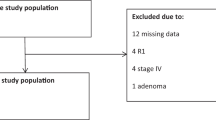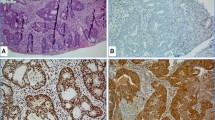Abstract
The recent years have seen the high heterogeneity of colorectal cancer (CRC) receiving increasing attention and being revealed step by step. Microsatellite instability (MSI), characterized by the dysfunction of mismatch repair gene, plays an important role in the heterogeneity of colorectal cancer. MSI status can be identified by immunohistochemistry for MMR protein such as MLH1, MSH2, PMS2, and MSH6 or PCR-based array for MMR gene. Recent studies have revealed MSI status is the only biomarker that can be used to select patients with high-risk stage II colon cancer for adjuvant chemotherapy. Furthermore, it always indicated better stage-adjusted survival when compared with microsatellite stable (MSS) tumors. For immunotherapy, patients with MSI tumors exhibited significant response to anti-PD-1 inhibitors after the failure to conventional therapy. In this chapter, we discuss the detection methods of MSI, the prognostic value of MSI, and its clinical guiding value in the management of precision therapy.
Access this chapter
Tax calculation will be finalised at checkout
Purchases are for personal use only
Similar content being viewed by others
References
Siegel RL et al (2017) Colorectal cancer statistics. CA Cancer J Clin 67(3):177–193
Athauda A et al (2019) Integrative molecular analysis of colorectal cancer and gastric cancer: what have we learnt?, Cancer Treat Rev. 73:31–40
Hutchins G et al (2011) Value of mismatch repair, KRAS, and BRAF mutations in predicting recurrence and benefits from chemotherapy in colorectal cancer. J Clin Oncol 29(10):1261–1270
Sargent DJ et al (2010) Defective mismatch repair as a predictive marker for lack of efficacy of fluorouracil-based adjuvant therapy in colon cancer. J Clin Oncol 28(20):3219
Yamamoto H, Imai K (2015) Microsatellite instability: an update. Arch Toxicol 89(6):899–921
Kim KJ et al (2014) Prognostic implications of tumor-infiltrating FoxP3+ regulatory T cells and CD8+ cytotoxic T cells in microsatellite-unstable gastric cancers. Hum Pathol 45(2):285–293
Yamamoto H et al (2014) An updated review of gastric cancer in the next-generation sequencing era: insights from bench to bedside and vice versa. World J Gastroenterol 20(14):3927–3937
Vilar E, Gruber SB (2010) Microsatellite instability in colorectal cancer-the stable evidence. Nat Rev Clin Oncol 7(3):153–162
Kim TM, Laird PW, Park PJ (2013) The landscape of microsatellite instability in colorectal and endometrial cancer genomes. Cell 155(4):858–868
Li GM (2013) Decoding the histone code: role of H3K36me3 in mismatch repair and implications for cancer susceptibility and therapy. Cancer Res 73(21):6379–6383
Jass JR (2006) Hereditary non-polyposis colorectal cancer: the rise and fall of a confusing term. World J Gastroenterol 12(31):4943–4950
Boland CR et al (1998) A National Cancer Institute Workshop on microsatellite instability for cancer detection and familial predisposition: development of international criteria for the determination of microsatellite instability in colorectal cancer. Cancer Res 58(22):5248–5257
Rampino N et al (1997) Somatic frameshift mutations in the BAX gene in colon cancers of the microsatellite mutator phenotype. Science 275(5302):967
Perucho M, Boland CR et al (1998) A National Cancer Institute workshop on microsatellite instability for cancer detection and familial predisposition: development of international criteria for the determination of microsatellite instability in colorectal cancer. Cancer Res 58:5248–5257
Ionov Y et al (1993) Ubiquitous somatic mutations in simple repeated sequences reveal a new mechanism for colonic carcinogenesis. Nature 363(6429):558–561
Moertel CG et al (1995) Fluorouracil plus levamisole as effective adjuvant therapy after resection of stage III colon carcinoma: a final report. Ann Intern Med 122(5):321–326
Koessler T et al (2008) Common variants in mismatch repair genes and risk of colorectal cancer. Gut 57(8):1097–1101
Lynch HT et al (2006) Phenotypic and genotypic heterogeneity in the Lynch syndrome: diagnostic, surveillance and management implications. Eur J Hum Genet 14(4):390–402
Smyth EC et al (2017) Mismatch repair deficiency, microsatellite instability, and survival: an exploratory analysis of the medical research council adjuvant gastric infusional chemotherapy (MAGIC) trial. JAMA Oncol 3(9):1197–1203
Andre T et al (2015) Adjuvant fluorouracil, leucovorin, and oxaliplatin in stage II to III colon cancer: updated 10-year survival and outcomes according to BRAF mutation and mismatch repair status of the MOSAIC study. J Clin Oncol 33(35):4176–4187
Tajima Y et al (2018) Prevalence and molecular characteristics of defective mismatch repair epithelial ovarian cancer in a Japanese hospital-based population. Jpn J Clin Oncol 48(8):728–735
Parikh AR et al (2019) MAVERICC, a randomized, biomarker-stratified, phase II study of mFOLFOX6-bevacizumab versus FOLFIRI-bevacizumab as first-line chemotherapy in metastatic colorectal cancer. Clin Cancer Res 25(10):2988–2995
Li P et al (2013) ERCC1, defective mismatch repair status as predictive biomarkers of survival for stage III colon cancer patients receiving oxaliplatin-based adjuvant chemotherapy. Br J Cancer 108(6):1238–1244
Tabernero J et al (2015) Analysis of circulating DNA and protein biomarkers to predict the clinical activity of regorafenib and assess prognosis in patients with metastatic colorectal cancer: a retrospective, exploratory analysis of the CORRECT trial. Lancet Oncol 16(8):937–948
Galon J et al (2006) Type, density, and location of immune cells within human colorectal tumors predict clinical outcome. Science 313(5795):1960–1964
Le DA-O et al (2017) Mismatch repair deficiency predicts response of solid tumors to PD-1 blockade. Science 357(6349):409–413
Le DT et al (2015) PD-1 blockade in tumors with mismatch-repair deficiency. N Engl J Med 372(26):2509–2520
Overman MJ et al (2017) Nivolumab in patients with metastatic DNA mismatch repair-deficient or microsatellite instability-high colorectal cancer (CheckMate 142): an open-label, multicentre, phase 2 study. Lancet Oncol 18(9):1182–1191
Omuro A et al (2018) xNivolumab with or without ipilimumab in patients with recurrent glioblastoma: results from exploratory phase I cohorts of CheckMate 143. Neuro-Oncology 20(5):674–686
Le DT et al (2016) Programmed death-1 blockade in mismatch repair deficient colorectal cancer. N Engl J Med 34(15_suppl):103–103
Overman MJ et al (2018) Durable clinical benefit with nivolumab plus ipilimumab in DNA mismatch repair-deficient/microsatellite instability-high metastatic colorectal cancer. Clin Oncol 36(8):773–779
Andre T et al (2017) Combination of nivolumab (nivo) + ipilimumab (ipi) in the treatment of patients (pts) with deficient DNA mismatch repair (dMMR)/high microsatellite instability (MSI-H) metastatic colorectal cancer (mCRC): CheckMate 142 study. J Clin Oncol 35:3531–3531
Anderson AC, Joller N, Kuchroo VK (2016) Lag-3, Tim-3, and TIGIT: Co-inhibitory receptors with specialized functions in immune regulation. Immunity 44(5):989–1004
Author information
Authors and Affiliations
Editor information
Editors and Affiliations
Rights and permissions
Copyright information
© 2020 Springer Science+Business Media, LLC, part of Springer Nature
About this protocol
Cite this protocol
Huang, Z., Chen, X., Liu, C., Cui, L. (2020). The Clinical Significance of Microsatellite Instability in Precision Treatment. In: Huang, T. (eds) Precision Medicine. Methods in Molecular Biology, vol 2204. Humana, New York, NY. https://doi.org/10.1007/978-1-0716-0904-0_3
Download citation
DOI: https://doi.org/10.1007/978-1-0716-0904-0_3
Published:
Publisher Name: Humana, New York, NY
Print ISBN: 978-1-0716-0903-3
Online ISBN: 978-1-0716-0904-0
eBook Packages: Springer Protocols




